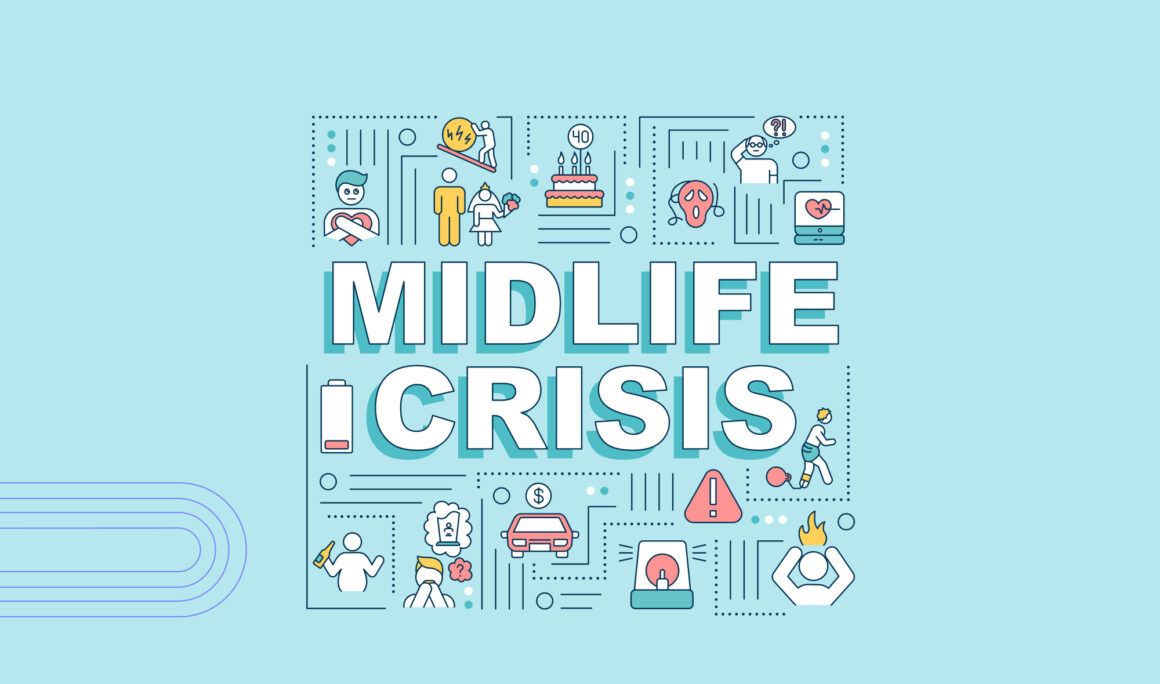Male midlife crisis stages: what are they, and how to deal each
By Julian Lewis • August 2, 2023

To prevent a midlife crisis, it's essential to take proactive steps in managing your well-being and addressing potential issues before they escalate.
It's no secret that men go through a midlife crisis. What is less well known, however, are the stages that make up this process, and the effects they can have on both the man and his loved ones.
In this article, we'll explore the six stages of a male midlife crisis, offer advice on how to best deal with each, and provide strategies to prevent a midlife crisis fog from occurring in the first place.
Join our Newsletter
Transform your career with our personal growth insights. Get one valuable tip right in your inbox every Saturday morning.
What is a midlife crisis?

A man's midlife crisis is a time when he reassesses his own mortality and wonders if he has done all he wanted to do.
To better understand this phenomenon, we first need to define midlife crisis and similar words. It is a period when an individual starts questioning their life's purpose, leading to emotional upheavals and potential changes in life direction.
For a 50-year-old man, the midlife crisis often becomes more prominent as they reflect on the accomplishments and goals they had set for themselves by this age. He may feel like he has lost his purpose and self-confidence and become dissatisfied with his accomplishments. The emotional crisis can be caused by a variety of events, such as experiencing a health scare, weight gain, having a child and watching them grow up and leave the nest, or losing a job.
This can be a difficult time for his loved ones as well, as he may exhibit signs of emotional instability, weight gain, or even violence.
For loved ones, especially spouses, understanding and letting go of a midlife crisis husband's behavior can be challenging, but with patience and empathy, relationships can endure and even strengthen.
Some people try to escape the feelings of dissatisfaction by having affairs with younger women, gambling, or spending large amounts of money. This can be a difficult time for his loved ones as well, as he may exhibit signs of emotional instability, violent outbursts, or other midlife crisis behavior.
While there is no one-size-fits-all approach to coping with a midlife crisis, there are some things that you can do to help manage the situation. And that starts by knowing how to recognize a midlife crisis. Recognizing men's midlife crisis common symptoms are crucial for both the individual and their loved ones.
Midlife Crisis vs. Depression
Many middle-aged adults are under the misconception that experiencing a midlife crisis and depression are the same thing. However, they are two very different things, although there can be times when one person's midlife crisis may look like another person's depression.
One of the main differences between a midlife crisis and depression is that while a midlife crisis often happens as a result of major life changes, such as a job loss, getting a divorce, or having children, depression is a mental health issue usually caused by something deeper, such as an illness or other major life events that have a negative impact.
A midlife crisis, in the field of psychology, refers to a period of emotional turmoil and self-reflection that individuals experience typically in their middle years, as they reassess their lives, goals, and sense of self.
Another key difference between the two is that while a midlife crisis can cause people to act out in anger or frustration, depression often leads to feelings of hopelessness and sadness. In addition, while a midlife crisis can come and go in relatively short periods of time, depression can be a more prolonged experience.
Midlife crisis vs dementia
A midlife crisis is a time when someone is questioning their life and what they have done so far. They may feel like they are stuck in a rut and want to change things up. Dementia, on the other hand, is a neurological major depressive disorder that affects memory, thinking, and behavior. It can be caused by a variety of diseases and conditions, including Alzheimer's disease.
People with dementia may experience changes in their moods and behavior, as well as problems with memory and thinking skills. Some people with dementia may also experience a midlife crisis, which can manifest as them wanting to make major changes or trying to recapture past experiences. However, while both conditions involve changes in someone's mental state, they are caused by very different factors and require different types of treatment.
Are midlife crises real?
Midlife crises are real, but there is no agreed-upon definition of what constitutes a midlife crisis. Some people tend to believe that a midlife crisis is a time when people reassess their lives and make changes to ensure that they are living the life they want to live. Others believe that a midlife crisis is a time of anxiety and stress caused by the realization that one is getting closer to old age.
What are the signs of a midlife crisis in men?

While the exact cause of a mid-life crisis in males can vary from person to person, there are many common signs. Whatever the cause, recognizing the signs of a crisis and seeking help can make the transition easier, both for yourself and those around you.
Happiness Slump
When men enter midlife, they may start to feel like they are running out of time to do the things they want to do. They may also feel like they have not accomplished enough in their lives. This can lead to a sense of unhappiness and dissatisfaction.
Becoming Withdrawn
Another sign of a midlife crisis for men is becoming increasingly withdrawn. While it is normal in relationships to have periods of time when you are not as close if this seems to be a pattern and if you feel lonely despite spending time with your wife or other loved ones, then there might be something more serious going on.
Frustration & Irritability with Work, Family, or Self
If you are experiencing frustration and irritability with work, family, or yourself, it could be a sign that you are going through a married man midlife crisis This can be a difficult time for many people, as they may feel like they are stuck in a rut and not sure how to move forward.
Sudden impulsivity
One common but lesser-known sign of a midlife crisis is sudden impulsivity, often leading to unexpected purchases that a person would not normally make. This can be anything from clothes, jewelry, and home accessories, to cosmetic surgery, to fancy cars and motorcycles. And if this sudden impulsive behavior is accompanied by feelings of dissatisfaction or unhappiness, it could be a sign that you are experiencing a midlife transition.
Drop in Life Satisfaction
For men, a drop in overall satisfaction can be also an early sign of a midlife crisis. This can be a difficult time for them, as they may feel like they are losing control of their lives. They may find themselves feeling more irritable or restless, and may have trouble focusing on tasks.
Increased mood changes
It is not uncommon for men to experience increased mood changes during midlife women. An example of this might be a man who is suddenly feeling a decreased interest in his job and is more interested in starting a new life. This can cause stress for both the man and his family members. It is important to try to address any changes that you are experiencing as early as possible so that you can avoid these sorts of problems.
Ending plans or giving up
Whether or not he's worried about turning a certain age, if he is giving up on things that are important to him or finding it difficult to commit, it could be time to consider his midlife crisis. It's not uncommon for people to experience a period of uncertainty and self-doubt in the middle of their life, especially if they're feeling as though they have accomplished most of what they wanted to do or expected to be doing by that point. This can cause serious problems if he doesn't address them effectively and work through his feelings.
Another aspect to consider is that midlife crises are not exclusive to men. Women, too, may experience 40 year-old woman midlife crisis. Although the stages and manifestations can vary, many women experiencing midlife crises may also question their life choices, experience dissatisfaction, and undergo emotional turmoil. "Letting go of a midlife crisis husband" involves understanding these dynamics and potentially seeking support for both partners or younger partner during this challenging period. It is important to recognize and address the unique challenges faced by middle aged woman during this transformative period.
What are the main causes of a midlife crisis?
According to psychologists, there are a number of different factors that can cause a midlife crisis. Some of the most common reasons include feeling dissatisfied with life, struggling to cope with stress or change, and dealing with health problems or chronic pain. Read on to learn more about what causes a midlife crisis.
Changing family dynamics
As people age, their families change. Kids grow up and move away, aging parents retire or die, and marriages end. These changes can be difficult to cope with and can cause a lot of stress. In addition, they can lead to feelings of loneliness and isolation, which can trigger a midlife crisis.
Physical changes
Additionally, changes to a man's physical health can trigger a midlife crisis. As men age, they may experience declines in fertility, sexual desire or function, and physical strength, as well as a variety of other health existential concerns. These changes to one's physical abilities can lead to feelings of insecurity and inadequacy, which can contribute to the development of a midlife crisis.
Changes in career
When someone has been doing the same, a stable job for the past few years, it can be difficult to make the switch to something new. Suddenly, they may feel like they are in uncharted territory and they may not be sure how to move forward. This can lead to emotional distress and feelings of anxiety and insecurity, which can then manifest as a midlife crisis. Providing support through farewell messages can ease the transition and offer reassurance during this challenging time.
Another example of an impactful career change could be approaching retirement. Many middle age men struggle to watch younger people take over the roles and responsibilities they once held. This makes it difficult to stay motivated and find a reason to keep working, which can lead to feeling frustrated and obsolete, causing internal conflict.
Changes in a financial situation
When a man's financial situation changes drastically, it can cause a midlife crisis. Then abruptly decides and find himself struggling to make ends meet and facing an uncertain future. This can be extremely stressful and overwhelming, leading to feelings of anxiety and depression. In some cases, men may even feel like they've failed and lost control of their lives.
All of these emotions can be very disruptive and may cause them to question everything they've known up to this point. As a result, they may start to feel like they need to make some major changes in order to recapture what they've lost. This can be a very difficult process, but it's important to remember that there is always hope. With time and effort, most middle-aged adults will be able to move past their midlife crises and reclaim their lives.
Childhood adversity as a risk factor
There is a growing body of research that suggests childhood adversity, or early childhood experiences such as abuse, neglect, and trauma can have a long-lasting impact on adult development. Many psychologists believe that these negative outcomes can in turn increase a man's risk of experiencing a midlife crisis, especially if he is already struggling with issues like stress and unhappiness.
What are the stages of a midlife crisis?

Midlife crises are a normal, albeit sometimes difficult, life stage that many people go through. There are six to 5 stages to a midlife crisis, and each person experiences these stages differently in their own way and at their own pace.
The first stage of a midlife crisis is the realization that one is an aging parent or maybe not. This realization may come at any time, from early adulthood to well into middle age. Regardless of when it occurs, this realization can be jarring and uncomfortable.
In the second stage of a midlife crisis, people often start to question their path or purpose. They may begin to doubt their skills, abilities, and goals, wondering if they have chosen the right career, soul mate or rromantic relationships. Alternatively, some people may feel that they need to start making different life choices in order to be truly happy sometimes different with midlife crisis mental breakdown.
In the third stage of a midlife crisis, individuals often look to others for advice and guidance. For example, they may start seeking out friends who seem to have their lives more "together" than they do. They may also join new social groups or try to reconnect with old acquaintances in the hopes of finding some guidance and support.
The fourth stage of a midlife crisis involves taking action. This can mean making big changes in one's life, such as switching careers or ending a relationship. It can also mean embracing different activities and hobbies or choosing to start taking better care of oneself physically and mentally.
In the fifth stage of a midlife crisis, individuals may feel more relaxed and at peace with their situation. However, there are still often feelings of disappointment or regret over certain choices or goals that were not realized.
The final stage of a midlife crisis is acceptance. Additionally, for some individuals experiencing a midlife crisis, separation from a long-term partner or spouse may be a part of their journey through the midlife crisis separation stages.
During this resolution stage, middle-aged individuals have learned to embrace their life situation and come to terms with their aging process. They may still feel shaken by certain changes in their lives, but they are now able to cope with these changes in a more positive way.
Join our Newsletter
Transform your career with our personal growth insights. Get one valuable tip right in your inbox every Saturday morning.
How to handle midlife crisis symptoms
Mid-life crisis is a term used to describe a time in a person's life when men or women experience midlife crises there are emotional turmoils and changes in their behavior. It can be a difficult time for many, as they may feel unsure of what they want to do with the rest of their lives. There are ways to deal with the distressing male midlife crisis symptoms marriage, however, and it is possible to emerge from this period feeling happier and more fulfilled.
Share Your Feelings
It can be helpful to share your feelings with someone during a time of midlife crisis. This can provide a sense of comfort and support, and it can make the experience less daunting. By expressing what you’re going through, you may find that you feel more relieved and understood. Additionally, it can be helpful to hear others’ stories about their own midlife crises in order to gain some perspective.
Recognize your feelings
Recognizing your feelings can help you to deal with them in a healthy way, which may lessen the symptoms of experiencing a midlife crisis. If you understand what you are going through and why you are feeling the way you do, it can be easier to manage your emotions.
Adjust your perception of midlife and aging
Middle adulthood can be a difficult time for some people. There is a lot of pressure to be "perfect" and to have it all together. But it's important to remember that everyone goes through these struggles at some point in their lives. It's normal to feel like you're not living up to your expectations, or that you're not aging the way you thought you would.
The key is to not let these negative thoughts get you down. It's okay to be a little unsure of yourself – everyone is at some point. Just try to focus on the good things in your life, and don't be too hard on yourself. Embrace this new phase in your life start a healthy routine, and enjoy the journey ahead!
Maintain a sense of purpose
A midlife crisis can be a difficult time for any man, but it can be especially hard to maintain a sense of purpose during this time. It can be easy to feel like you've lost your way or that you don't know what you're supposed to be doing with your life. During a midlife crisis, it's important to stay focused on what is important to you and to maintain your sense of purpose.
One way to stay focused and maintain your sense of purpose during a midlife crisis is to set goals. Make a list of things you want to achieve in the next year or five years, and focus on working towards these goals. This can help keep you motivated and give you something to look forward to.
Another way to maintain your sense of purpose during a midlife crisis is to stay connected to your passions. What things do you love doing? What makes you feel alive and happy? Find ways to incorporate these things into your life as much as possible. Doing things that make you happy will help keep you positive and motivated during this challenging time.
Lastly, don't be afraid to ask for help. If you're struggling to maintain your sense of purpose during a midlife crisis, there is no shame in seeking out help from professionals or friends and family. Talk to a mental health professional about how you're feeling and ask for their support. There are many effective midlife crisis treatment options, and you do not have to go through this alone.
Prioritize self-care
Prioritizing self-care is key in alleviating some of the common symptoms. Taking time for yourself each day to do something that makes you happy – whether it's reading, going for a walk, or taking a yoga class – helps men feel more centered and balanced. When you are feeling good, it's easier to manage the other stressors in your own life.
Accept change
Lastly, one of the most difficult but crucial aspects of combatting the symptoms of a male mid-life crisis is accepting abrupt change. The changes that are both internally and externally caused often require a lot of understanding and acceptance. Things will happen in your life that don't make sense and they may not be the most convenient thing, but acceptance is the key.
Positive aspects of a midlife crisis
Contrary to popular belief, not everything about a midlife crisis is negative. There are a number of good things that can come out of this period in an individual's life, including the following:
1. Increased self-awareness and self-reflection. A midlife crisis can give people the opportunity to reflect on their lives and assess what has worked well for them so far, as well as what has not worked. This can help people to better understand themselves, their goals, and what they truly want out of life.
2. Increased motivation and productivity. By taking the time to check and reflect on their lives with midlife productivity tips, many people find that they are more motivated to make positive changes in various areas of their lives. They may also feel a renewed sense of purpose and direction, which can help them to be more productive in pursuing their goals.
3. Greater meaning and fulfillment. A midlife crisis can often lead people to discover a deeper sense of meaning and purpose in life. This may include engaging in volunteer work or activities that better align with their values, or exploring new career paths that better align with their goals and interests.
While a midlife crisis can sometimes be difficult to manage, it is important to remember that there are many positive things that can come out of this challenging time. And by taking the time to focus on these positives, individuals can better cope with the challenges that they may face during this period in their lives.
Conclusion: a focus on change
A man's mid-life crisis can manifest in a variety of ways, but often include feelings of anxiety or depression, changes in sleeping and eating habits, problems with focus or concentration, and increased levels of stress.
There are many coping strategies available to deal with the symptoms of a midlife crisis examples, including in-person or online therapy with a mental health professional, medication, and self-care techniques. It is also important to accept that change is part of life and to focus on the positive aspects of this time period. By doing so, you can make the most out of your midlife crisis and come out stronger on the other side.
To learn more about coping strategies and self-improvement during this transformative period, consider exploring our list of top 10 Shadow Work books. If you're interested in understanding the vital role of middle managers in organizations, check out our blog post on demystifying the middle manager.
Related articles:
Unveiling the Dark Art of Gaslighting: Real-World Gaslight Examples and Experiences.
Join our Newsletter
Transform your career with our personal growth insights. Get one valuable tip right in your inbox every Saturday morning.
Read more about: Healthy Relationships, Life Coaching, Existential Crisis
About Julian Lewis
Julian Lewis is a driven and accomplished professional with a passion for driving positive change in the business world. He is the co-founder and COO at Zella Life.
His own experience as a professional of color in a Fortune 500 company led him to discover the limitations for advancement that many professionals like himself face. Determined to reach his full potential, Julian became an established business coach and entrepreneur, committed to supporting others in their pursuit of personal and professional growth.
Today, Julian is a recognized corporate trainer, coach, and leader, known for his ability to leverage real-life experiences and evidence-based methodologies to affect positive change within individuals and organizations. As the leader of Zella Life's coaching division, he is dedicated to empowering individuals and businesses to achieve their full potential.